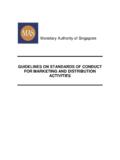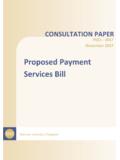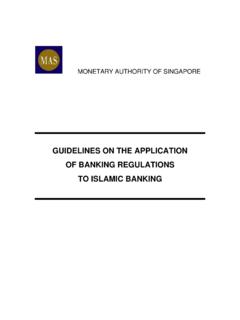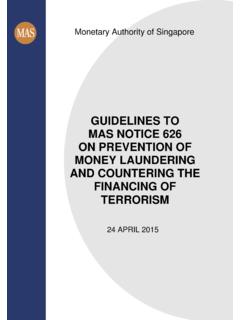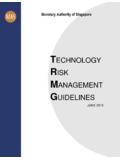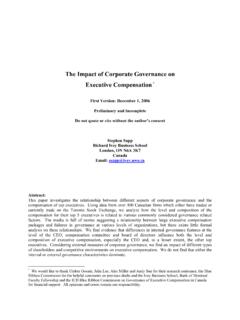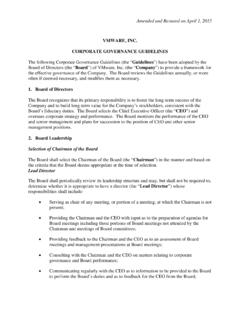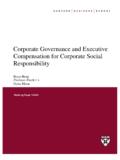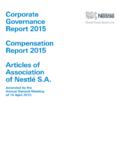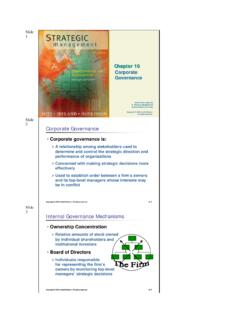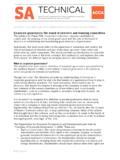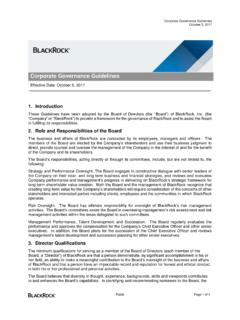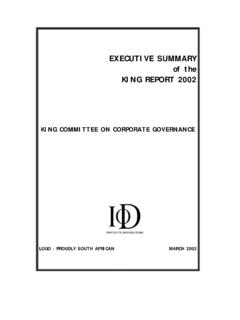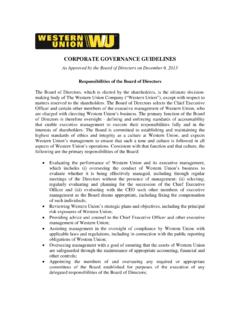Transcription of CODE OF CORPORATE GOVERNANCE 2 MAY 2012
1 code OF CORPORATE GOVERNANCE 2 MAY 2012 code OF CORPORATE GOVERNANCE 2012 BOARD MATTERS Page 2 of 33 BOARD MATTERS THE BOARD'S CONDUCT OF AFFAIRS Principle: 1 Every company should be headed by an effective Board to lead and control the company. The Board is collectively responsible for the long-term success of the company. The Board works with Management to achieve this objective and Management remains accountable to the Board. Guidelines: The Board's role is to: (a) provide entrepreneurial leadership, set strategic objectives, and ensure that the necessary financial and human resources are in place for the company to meet its objectives; (b) establish a framework of prudent and effective controls which enables risks to be assessed and managed, including safeguarding of shareholders' interests and the company's assets; (c) review management performance; (d) identify the key stakeholder groups and recognise that their perceptions affect the company's reputation; (e) set the company's values and standards (including ethical standards), and ensure that obligations to shareholders and other stakeholders are understood and met.
2 And (f) consider sustainability issues, environmental and social factors, as part of its strategic formulation. All directors must objectively discharge their duties and responsibilities at all times as fiduciaries in the interests of the company. The Board may delegate the authority to make decisions to any board committee but without abdicating its responsibility. Any such delegation should be disclosed. code OF CORPORATE GOVERNANCE 2012 BOARD MATTERS Page 3 of 33 The Board should meet regularly and as warranted by particular circumstances, as deemed appropriate by the board members. Companies are encouraged to amend their Articles of Association (or other constitutive documents) to provide for telephonic and video-conference meetings.
3 The number of meetings of the Board and board committees held in the year, as well as the attendance of every board member at these meetings, should be disclosed in the company's Annual Report. Every company should prepare a document with guidelines setting forth: (a) the matters reserved for the Board's decision; and (b) clear directions to Management on matters that must be approved by the Board. The types of material transactions that require board approval under such guidelines should be disclosed in the company's Annual Report. Incoming directors should receive comprehensive and tailored induction on joining the Board. This should include his duties as a director and how to discharge those duties, and an orientation program to ensure that they are familiar with the company's business and GOVERNANCE practices.
4 The company should provide training for first-time director1 in areas such as accounting, legal and industry-specific knowledge as appropriate. It is equally important that all directors should receive regular training, particularly on relevant new laws, regulations and changing commercial risks, from time to time. The company should be responsible for arranging and funding the training of directors. The Board should also disclose in the company's Annual Report the induction, orientation and training provided to new and existing directors. Upon appointment of each director, the company should provide a formal letter to the director, setting out the director's duties and obligations. 1 A first time director is a director who has no prior experience as a director of a listed company.
5 code OF CORPORATE GOVERNANCE 2012 BOARD MATTERS Page 4 of 33 BOARD COMPOSITION AND GUIDANCE Principle: 2 There should be a strong and independent element on the Board, which is able to exercise objective judgement on CORPORATE affairs independently, in particular, from Management and 10% shareholders2. No individual or small group of individuals should be allowed to dominate the Board's decision making. Guidelines: There should be a strong and independent element on the Board, with independent directors making up at least one-third of the Board. The independent directors should make up at least half of the Board where: (a) the Chairman of the Board (the "Chairman") and the chief executive officer (or equivalent) (the "CEO") is the same person; (b) the Chairman and the CEO are immediate family3 members; (c) the Chairman is part of the management team; or (d) the Chairman is not an independent director.
6 An "independent" director is one who has no relationship with the company, its related corporations4, its 10% shareholders or its officers that could interfere, or be reasonably perceived to interfere, with the exercise of the director's independent business judgement with a view to the best interests of the company. The Board should identify in the company's Annual Report each director it considers to be independent. The Board should determine, taking into account the views of the Nominating Committee ("NC"), whether the director is independent in character and judgement and whether there are relationships or circumstances which are likely to affect, or could appear to affect, the director's judgement. Directors should disclose to the Board any such relationship as and when it arises.
7 The Board should state its reasons if it determines that a director 2 The term "10% shareholder" shall refer to a person who has an interest or interests in one or more voting shares in the company and the total votes attached to that share, or those shares, is not less than 10% of the total votes attached to all the voting shares in the company. "Voting shares" exclude treasury shares. 3 The term "immediate family" shall have the same meaning as currently defined in the Listing Manual of the Singapore Exchange (the "Listing Manual"), the person's spouse, child, adopted child, step-child, brother, sister and parent. 4 The term "related corporation", in relation to the company, shall have the same meaning as currently defined in the Companies Act, a corporation that is the company's holding company, subsidiary or fellow subsidiary.
8 code OF CORPORATE GOVERNANCE 2012 BOARD MATTERS Page 5 of 33 is independent notwithstanding the existence of relationships or circumstances which may appear relevant to its determination, including the following: (a) a director being employed by the company or any of its related corporations for the current or any of the past three financial years; (b) a director who has an immediate family member who is, or has been in any of the past three financial years, employed by the company or any of its related corporations and whose remuneration is determined by the remuneration committee; (c) a director, or an immediate family member, accepting any significant compensation from the company or any of its related corporations for the provision of services, for the current or immediate past financial year, other than compensation for board service; (d) a director: (i) who, in the current or immediate past financial year, is or was.
9 Or (ii) whose immediate family member, in the current or immediate past financial year, is or was, a 10% shareholder of, or a partner in (with 10% or more stake), or an executive officer of, or a director of, any organisation to which the company or any of its subsidiaries made, or from which the company or any of its subsidiaries received, significant payments or material services (which may include auditing, banking, consulting and legal services), in the current or immediate past financial year. As a guide, payments5 aggregated over any financial year in excess of S$200,000 should generally be deemed significant; (e) a director who is a 10% shareholder or an immediate family member of a 10% shareholder of the company; or (f) a director who is or has been directly associated with6 a 10% shareholder of the company, in the current or immediate past financial year.
10 5 Payments for transactions involving standard services with published rates or routine and retail transactions and relationships (for instance credit card or bank or brokerage or mortgage or insurance accounts or transactions) will not be taken into account, unless special or favourable treatment is accorded. 6 A director will be considered "directly associated" with a 10% shareholder when the director is accustomed or under an obligation, whether formal or informal, to act in accordance with the directions, instructions or wishes of the 10% shareholder in relation to the CORPORATE affairs of the corporation. A director will not be considered "directly associated" with a 10% shareholder by reason only of his or her appointment having been proposed by that 10% shareholder.
